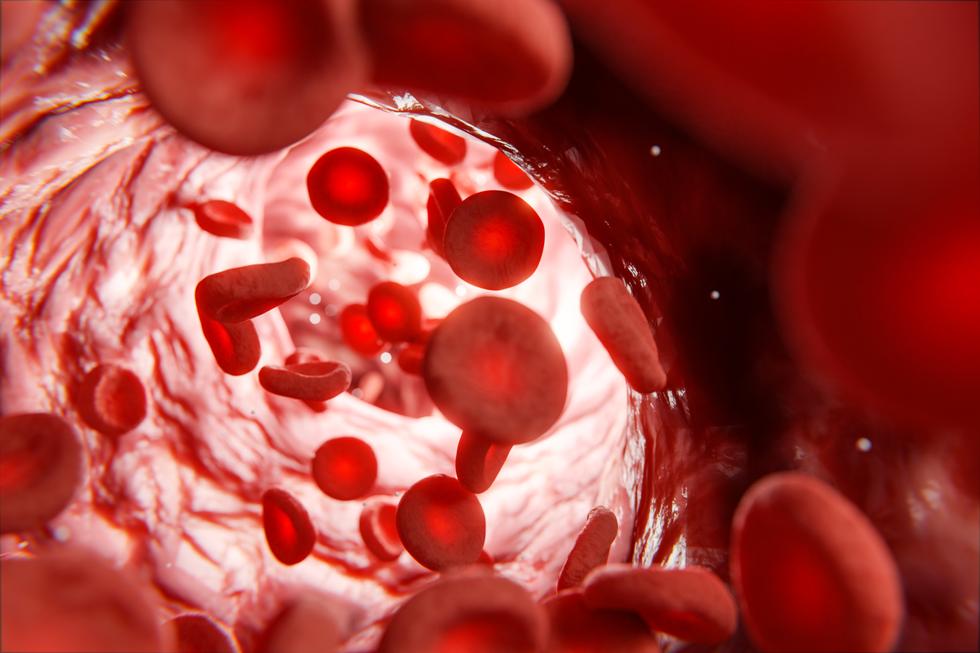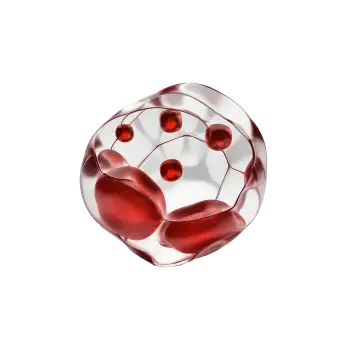What are red blood cells?
Red blood cells are the most common cells in our blood and are specialized in transporting oxygen and carbon dioxide. They are small and biconcave (concave on both sides) and completely lack a cell nucleus. This unique shape gives them a larger surface area to carry oxygen and increases flexibility to pass through the body's narrow, thin blood vessels. Red blood cells also contain a molecule called hemoglobin HB, which binds oxygen and carbon dioxide for transport, so this marker is highly relevant to measure and is included in checking your blood status.
The function of red blood cells
The primary function of red blood cells is to transport oxygen from the lungs to the body's tissues and carbon dioxide back to the lungs to be exhaled. This is made possible by the hemoglobin molecule found in the red blood cells. Hemoglobin binds oxygen in the lungs and then releases it into the tissues where it is needed. At the same time, hemoglobin takes up carbon dioxide from the tissues and transports it to the lungs to be exhaled.
Blood values and measurements
To evaluate the function and health of red blood cells, blood tests can be performed to measure different blood values, often this specific blood test is called blood status or blood picture. The most common measurements include hemoglobin (Hb), hematocrit (EVF), Hemoglobin mass (MCH), Erythrocytes,, (the amount of erythrocytes in the blood).
- Hemoglobin (Hb): Hemoglobin is a protein found in the red blood cells and has a central role in transporting oxygen from the lungs to the rest of the body. The amount of hemoglobin in the blood affects its oxygen-carrying capacity and gives the blood its characteristic red color. Low hemoglobin levels can indicate anemia, which can lead to fatigue and shortness of breath.
- Hematocrit (EVF): The hematocrit measurement indicates the proportion of red blood cells in relation to the total blood volume. An increase or decrease in hematocrit values can provide information about blood concentration and indicate various health conditions. For example, high hematocrit values may indicate dehydration, while low values may be linked to anemia or overhydration.
- MCH (Mean corpuscular hemoglobin mass): MCH is a measure of the average amount of hemoglobin per red blood cell. This value provides information on how much hemoglobin each individual red blood cell contains. Changes in MCH values can contribute to the diagnosis and monitoring of various forms of anemia.
- Erythrocytes (Red blood cells): The number of red blood cells in a given volume of blood is measured by the term erythrocytes. These cells contain hemoglobin and are responsible for transporting oxygen to the tissues. Changes in the number of red blood cells can indicate various diseases, including anemia or other blood disorders.
The above blood values provide valuable information about the body's ability to transport oxygen, the blood concentration and any deviations that may affect health.
What affects the blood values?
Several factors can affect blood levels, including diet, physical activity, altitude and genetic factors. A deficiency of iron, vitamin B12 or folic acid can lead to anemia, which means there are too few red blood cells or insufficient hemoglobin. On the other hand, certain medical conditions, such as polycythemia, can lead to too many red blood cells.
Clinical conditions related to red blood cells
In addition to anemia and polycythemia, there are several other clinical conditions that can affect red blood cells. Such conditions include sickle cell anemia, an inherited disease that affects the shape of the red blood cells, and thalassemia, an inherited disease that affects the production of hemoglobin. It is important to understand and detect these conditions in order to provide the right treatment and care.
How to Promote Red Blood Cell Health
To promote red blood cell health and maintain normal blood levels, there are several important steps that can be taken. A balanced diet that contains enough iron, vitamin B12, folic acid and other important nutrients is essential. Regular exercise and avoiding smoking can also help improve blood circulation and oxygenation.
Red blood cells and exercise
For athletes and people who engage in regular physical training, red blood cells are of particular importance. Exercise can increase the production of red blood cells and improve oxygenation of the muscles. This can lead to improved endurance and performance. Some athletes may also use methods such as high-altitude training or blood doping to increase the number of red blood cells and improve oxygen transport.
The life cycle of red blood cells
The lifespan of a red blood cell is approximately 120 days. After this time, the red blood cells are broken down in the spleen and liver, where they reuse important molecules such as iron. The new red blood cells are continuously produced in the bone marrow and released into the bloodstream to replace the old cells.
Red blood cells are vital to the body's overall health and well-being. By transporting oxygen and carbon dioxide, they contribute to maintaining normal physiological functions. Abnormalities in the number or function of red blood cells can have serious consequences and affect various organ systems in the body.Management of blood disorders that affect your red blood cells
If you are diagnosed with a blood disorder such as anemia or thalassemia, various treatments may be available, including dietary changes, medications, and in some cases blood transfusions or bone marrow transplants. The doctor's assessment and clinical evaluation are crucial in choosing the right treatment path and adapting it to individual needs and the severity of the disease. Consultation with a physician is necessary to make informed decisions about treatment and care.






















